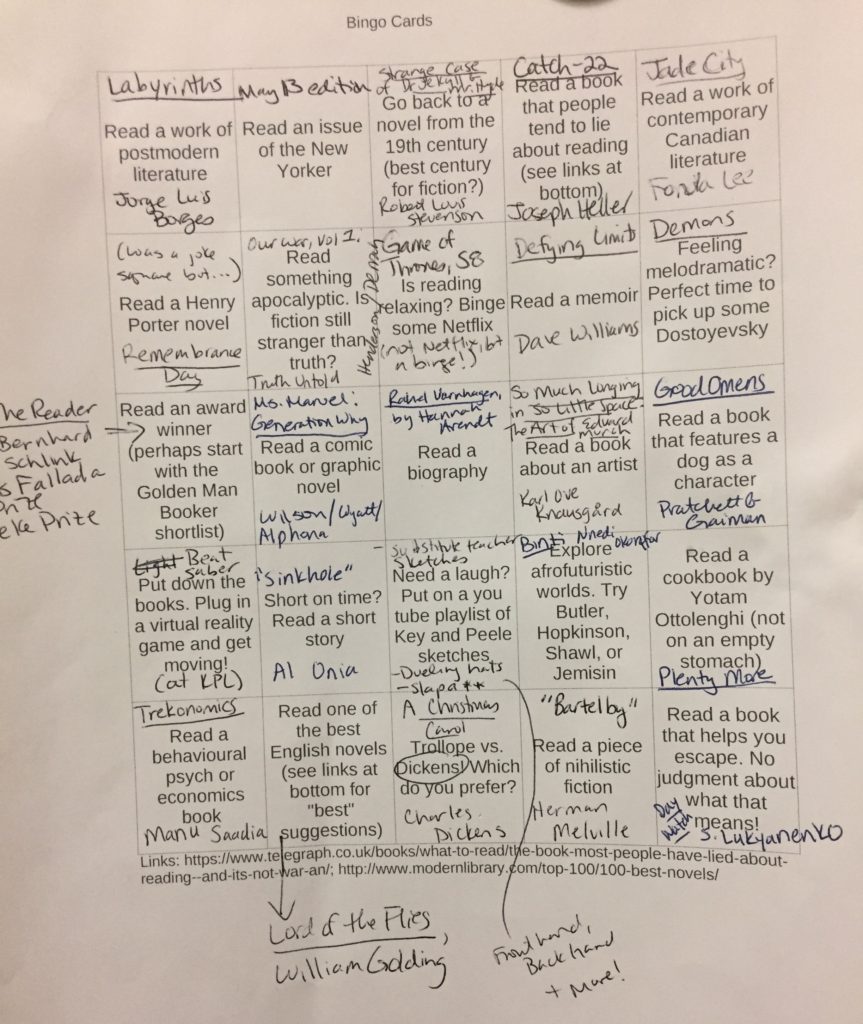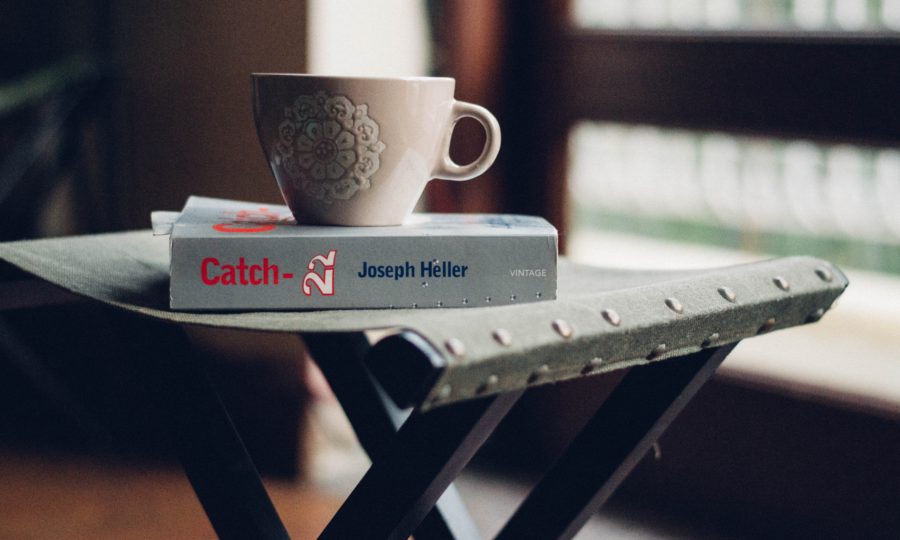I might be slightly hyperbolic in asserting that book bingo changed my life. But it did reorient me in ways I didn’t expect.
The 2019 book bingo challenge
Inspired by the Kitchener Public Library‘s book bingo in the summer of 2018, I decided to create a bingo card for my workplace. The challenge would run for the entire calendar year. Each colleague’s leisure reading interests would be represented by at least one square on the bingo card. You’ll notice that a few squares correspond to activities other than books, because some of my colleagues don’t read for fun. Bingo participants would become eligible for prizes at various stages of completing the card.
I finished the entire card. Humble brag, and all.
Yes, I finished the card on December 30. Yes, the books I chose got shorter come November when I realized how many squares I had remaining! Only four squares were marked off with novel read for my book club. Only one book was a re-read. (Good Omens. Love it, love it, love it. But, the violence against witches–against women–really irked me this time. For a good discussion of this point, check out Chipperish Media).

How book bingo re-oriented me
I went to bed early last night after finishing William Golding’s Lord of the Flies, marking off the final square of my bingo card.
The novel deals with such heavy material, that I didn’t want to start another book. I turned on a podcast, but found I couldn’t pay attention to it. Emotionally I did not really want to sit with the novel, but I felt that I must.
Did I read Lord of the Flies in school? I don’t remember reading it, though I know I bought it because it was an option to choose from. How was my reading of Lord of the Flies different as a 35-year-old than as a teenager? Would I have sympathized with Ralph and Piggy more, whereas now I think about how all the characters fail to take responsibility?
The moral work of reading
During a talk I attended in October on Marc Weitzmann’s recent book Hate: The Rising Tide of Anti-Semitism in France (And What It Means for Us), a participant asked Weitzmann what cultural forces can challenge the rise of nationalistic identity politics that reject pluralistic societies. Everyone in the audience wrestled with this question. Though far from giving a firm answer, Weitzmann, who is a novelist as well as a journalist, suggested that perhaps we all need to read more literature.
Similarly, philosophers have argued that reading literature, and storytelling more generally, does moral and epistemic work. Reading helps a person confront different perspectives and cultivate empathy.
I’m not sure I am more empathetic having completed the 2019 book bingo challenge. But I did grow as a reader, and as a thinker.
I cultivated more self-awareness of my position as a reader, intentionally wrestling with moral ambiguities as presented in the books I read.
I think more about the stories I read. I read–and want to read–more of the introductions and secondary literature (after finishing the books) to better understand the context.
My sense of worldliness has been enriched and expanded.
Is this a life change? At the very least, I feel re-oriented in and to the world.
Book bingo highlights
See the picture above to match titles with categories.
Favourite: Catch-22, byJoseph Heller
I didn’t even choose to read it; my childhood friend Ashley picked it for us to read together. For the first third of the book I despised it, even though I recognized Heller’s genius. But then something clicked for me, and it’s a book that has sat with me many months later. I don’t want to read the sequel, because the ending is pretty much perfect.
Expected to like but didn’t: Labyrinths, by Jorges Luis Borges
Maybe I just need to read Borges more like I read philosophy, and less like I read for fun.
Expected to dislike but enjoyed: Plenty More: Vibrant Vegetable Cooking by London’s Ottolenghi, by Yotam Ottolenghi
Despite my negativity about non-vegan vegetable forward cookbooks and my skepticism that Ottolenghi could really be all that, I admit my errors. Ottolenghi is ALL THAT. I now stock fresh curry leaves.
Best surprise: So Much Longing in So Little Space: The Art of Edvard Munch, by Karl Ove Knausgaard
I found this book through cross-referencing LitHub lists and reviews with books available though the Bard College library. This book did not disappoint: Less a biography and more of a memoir of an author’s encounters and journey’s with Munch. A delightful ride.
Gave me the worst dreams: Demons, by Fyodor Dostoyevsky
And it’s long! I read it in about six weeks, with a quick break in between to read Naomi Novik’s Spinning Silver. That’s a lot of bad dreams! I’m glad I read it, but my sleep definitely improved after I finished it.
After doing research on translations, I chose Robert A. Maguire’s, and enjoyed it.
Most disappointing: Defying Limits, by Dave Williams
In this memoir from the Canadian astronaut, I was hoping for more discussion of his scientific research, which involved taking rats to space. The book proved to be a more fluffy, less detailed read about Williams life. It’s not that the book was bad, per say–Good Reads suggests that it is great! But the book wasn’t what I was expecting, or hoping for.
Most disturbing: Bartleby, by Herman Melville
So . . . very . . . disturbing. So very outside my normal frame of reference.
New reading habits: The New Yorker
I am now a subscriber. Reading the New Yorker definitely makes me feel more connected to the world, and more worldly.
And some non-bingo books I recommend
- Weitzmann’s Hate
- Maxim Osipov‘s Rock, Paper, Scissors
My New Year’s Resolution: Focus less on white, straight, cis-male authors.
Based on my bingo card and quick review, you might think that only privileged white men write great books. Tis’ not so, though that critique is fair about my bingo card.
I will shout out Binti, which was my first read by author Nnedi Okorafor, who I first discovered through the LeVar Burton Reads podcast. I read the entire trilogy, which is rare for me to do with a book I’ve read for book club (only because of the volume of books we read). Book club is actually quite strong in diversity, I should say, thanks to the conscientiousness and curiosity of our organizer.
I think part of my lack of diversity was choosing books that have graced my shelves (i.e., Lord of the Flies, Labyrinths, The Reader), sometimes for twenty years, but that I had not read. Some of it was poor timing and planning. Had I not already recorded Our War for post-apocalyptic, I could have used Trail of Lightning by up-and-coming superstar Rebecca Roanhorse for that category.
Credits
Feature photo by Hans Vivek on Unsplash
